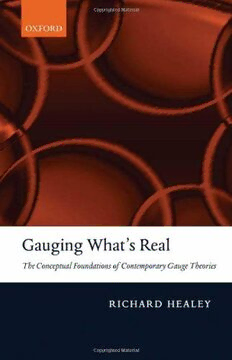Download Gauging What's Real: The Conceptual Foundations of Gauge Theories PDF Free - Full Version
Download Gauging What's Real: The Conceptual Foundations of Gauge Theories by Richard Healey in PDF format completely FREE. No registration required, no payment needed. Get instant access to this valuable resource on PDFdrive.to!
About Gauging What's Real: The Conceptual Foundations of Gauge Theories
Gauge theories have provided our most successful representations of the fundamental forces of nature. How, though, do such representations work? Interpretations of gauge theory aim to answer this question. Through understanding how a gauge theory's representations work, we are able to say what kind of world our gauge theories reveal to us. A gauge theory's representations are mathematical structures. These may be transformed among themselves while certain features remain the same. Do the representations related by such a gauge transformation merely offer alternative ways of representing the very same situation? If so, then gauge symmetry is a purely formal property since it reflects no corresponding symmetry in nature. Gauging What's Real describes the representations provided by gauge theories in both classical and quantum physics. Richard Healey defends the thesis that gauge transformations are purely formal symmetries of almost all the classes of representations provided by each of our theories of fundamental forces. He argues that evidence for classical gauge theories of forces (other than gravity) gives us reason to believe that loops rather than points are the locations of fundamental properties. In addition to exploring the prospects of extending this conclusion to the quantum gauge theories of the Standard Model of elementary particle physics, Healey assesses the difficulties faced by attempts to base such ontological conclusions on the success of these theories.
Detailed Information
| Author: | Richard Healey |
|---|---|
| Publication Year: | 2007 |
| ISBN: | 9780199287963 |
| Pages: | 318 |
| Language: | English |
| File Size: | 2.435 |
| Format: | |
| Price: | FREE |
Safe & Secure Download - No registration required
Why Choose PDFdrive for Your Free Gauging What's Real: The Conceptual Foundations of Gauge Theories Download?
- 100% Free: No hidden fees or subscriptions required for one book every day.
- No Registration: Immediate access is available without creating accounts for one book every day.
- Safe and Secure: Clean downloads without malware or viruses
- Multiple Formats: PDF, MOBI, Mpub,... optimized for all devices
- Educational Resource: Supporting knowledge sharing and learning
Frequently Asked Questions
Is it really free to download Gauging What's Real: The Conceptual Foundations of Gauge Theories PDF?
Yes, on https://PDFdrive.to you can download Gauging What's Real: The Conceptual Foundations of Gauge Theories by Richard Healey completely free. We don't require any payment, subscription, or registration to access this PDF file. For 3 books every day.
How can I read Gauging What's Real: The Conceptual Foundations of Gauge Theories on my mobile device?
After downloading Gauging What's Real: The Conceptual Foundations of Gauge Theories PDF, you can open it with any PDF reader app on your phone or tablet. We recommend using Adobe Acrobat Reader, Apple Books, or Google Play Books for the best reading experience.
Is this the full version of Gauging What's Real: The Conceptual Foundations of Gauge Theories?
Yes, this is the complete PDF version of Gauging What's Real: The Conceptual Foundations of Gauge Theories by Richard Healey. You will be able to read the entire content as in the printed version without missing any pages.
Is it legal to download Gauging What's Real: The Conceptual Foundations of Gauge Theories PDF for free?
https://PDFdrive.to provides links to free educational resources available online. We do not store any files on our servers. Please be aware of copyright laws in your country before downloading.
The materials shared are intended for research, educational, and personal use in accordance with fair use principles.

